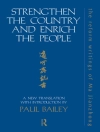In ‘Rousseau and Romanticism, ‘ Irving Babbitt examines the profound influence of Jean-Jacques Rousseau on the Romantic movement, dissecting the philosophical underpinnings that shaped modern thought. Babbitt’s analysis spans various genres, blending literary criticism with philosophical exploration to highlight the tension between individualism and social responsibility. His prose is both incisive and elegantly crafted, inviting readers to reflect on the implications of Rousseau’s ideas in the context of Romanticism’s emotional and aesthetic expressions. The text serves as a literary critique, firmly grounding it within the intellectual landscape of the early 20th century, a period marked by a reevaluation of humanism and societal values. Irving Babbitt, a prominent critic and scholar, was deeply influenced by his educational background at Harvard and his engagement with classical humanism and the New Humanism movement. His experiences led him to grapple with the dichotomy between reason and emotion, as captured in Rousseau’s work, ultimately provoking a critical examination of Romanticism’s excesses and philosophical roots. Babbitt’s upbringing and scholarly pursuits imbue the text with a weighty authority, underscoring his mastery of both literary criticism and ethical inquiry. This book is an essential read for scholars of literature and philosophy, as well as anyone interested in the historical interplay between Rousseau’s ideas and the burgeoning Romantic movement. Babbitt’s compelling arguments illuminate the complexities of human emotion and rationality, making it an indispensable resource for understanding the evolution of modern thought.
Про автора
Irving Babbitt (1865–1933) was a renowned American academic and literary critic whose ideas significantly shaped the development of New Humanism in the early 20th century. Babbitt, a professor at Harvard University, was an outspoken critic of Romanticism and a proponent of classical standards in education and the arts. His scholarly rigor and dedication to high cultural ideals made him a towering figure in the conservative intellectual circles of his time. One of Babbitt’s most influential works, ‘Rousseau and Romanticism’ (1919), is a seminal critique in which he assesses the impact of Jean-Jacques Rousseau’s ideas on the cultural and moral landscape of modern society. Babbitt contends that Romanticism, as derived from Rousseau’s thought, championed unchecked imagination and emotions at the expense of reason and tradition, leading to cultural decay. Babbitt’s literary style is characterized by incisive analysis, extensive erudition, and a profound understanding of both Eastern and Western philosophical traditions. Through his writings, he sought not only to analyze literature and culture but also to provide a framework for the betterment of society through the reinvigoration of classical humanist values. His contributions to literary criticism and cultural commentary have left an enduring mark on the intellectual history of the United States.












